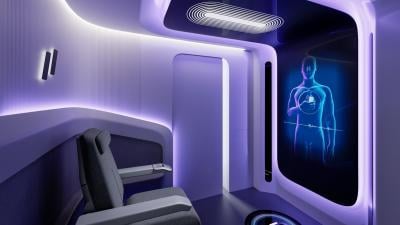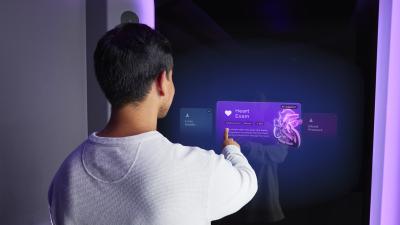Primary care player Forward unveiled this week what it has been quietly working on the past two years—self-serve CarePods that use artificial intelligence to screen and diagnose health conditions.
The new CarePods, which look like kiosks, are being deployed in malls, gyms, and offices starting in the San Francisco Bay Area, New York, Chicago and Philadelphia. Forward plans to more than double its footprint in 2024, the company said.
The AI-based CarePods are designed like kiosks that automate medical check-ups. The CarePods are the next step in the company's vision to use technology to scale healthcare services to large populations, essentially, everybody, Adrian Aoun, Forward's outspoken founder and CEO, told Fierce Healthcare in an interview to preview the CarePods.
"We ask ourselves, 'What would it take to get healthcare to the whole planet?' You quickly realize when you peel back the layers of the onion that we're doing healthcare all wrong. Today, healthcare is based on doctors and nurses. And, they're awesome, but you're never going to scale doctors and nurses to the whole planet. Our insight was actually healthcare should just be a product. We should just take every single thing that doctors and nurses are doing and just migrate it over to hardware and software because we can scale that healthcare to the planet," Aoun said.
Forward also picked up $100 million in a series E funding round to build and roll out the Forward CarePods. The new investment was backed by Khosla Ventures, Founders Fund and Softbank. The Information reported the latest funding includes equity financing of more than $50 million as well as debt financing.
The startup has raised $657 million to date, according to Tech Crunch.
The company launched in 2016 as a tech-enabled direct primary care business based on a cash-pay model that doesn't take insurance. It last raised a $225 million series D funding round in 2021 backed by Founders Fund, Khosla Ventures and Softbank as well as Marc Benioff, founder, chairman and CEO of Salesforce, and musician The Weeknd. The company was reportedly worth $1 billion at the time of its series D.
Aoun declined to disclose Forward's current valuation or the primary care provider's current total membership.
"The same way that Apple ushered in a mobile computing revolution, we want to usher in a healthcare computing revolution. We want to power the new wave of healthcare."—Adrian Aoun, co-founder and CEO of Forward
The primary care space has seen a frenzy of activity in the past two years with major M&A deals like CVS scooping up Oak Street Health for $10.6 billion, Amazon buying One Medical for $3.9 billion and Walgreens' VillageMD acquiring Summit Health-CityMD for nearly $9 billion.
Forward, however, has been relatively quiet since its 2021 series D fundraising round.
In the past seven years, the healthcare "unicorn" has built out tech-enabled primary care clinics in 19 locations with more than 100 primary care clinicians.
But, ultimately, Aoun and his team at Forward "don't believe that a doctor's office should exist," he said.
"Every day, we're just watching what happens inside one of our clinics. You sit in the exam chair, you talk to your doctor about the flu, and we go 'Let's build that into a mobile app.' A patient comes in to talk to their doctor about skin issues so we build a skin scanner. I come in to talk to my doctor about heart issues and we build the body scanner app," he said. "Slowly but surely, what we're doing is just migrating every single thing from doctor and nurse to hardware and software."

Before founding Forward, Aoun headed up special projects for the CEO of Google/Alphabet, where he founded one of the Alphabet companies Sidewalk Labs. He arrived at Google upon the acquisition of his AI startup Wavii, and spent his first year at Google helping to create and build their AI division.
The AI-based CarePods, modules that look a bit like an airport lactation room, bring health diagnostics and care plans from doctors’ offices directly to the public, putting users in the driver’s seat of their health, Aoun said.
The idea is to get care to every street corner using Forward's "autonomous doctor's office," according to the company.
Forward leverages proprietary AI to turn clinical expertise and the latest medical research into diagnostic tools and care plans for CarePod users, Aoun said.
Membership starts at $99 a month.
The CarePods use sensors, lab tests and vital sign measurements to enable continuous progress monitoring, identify disease risks and provide health evaluations.
The modules use technology to establish a baseline of a user's health and feature biometric body scans, blood testing and diagnostic screening based on the health apps that the primary care company has been building for its membership over the past seven years. The health apps can address a range of disease areas, including diabetes, hypertension and depression and anxiety, according to the company.
As an example, the CarePod's skin cancer scanner can track and monitor things like skin lesions and discolorations over time. The company's mental health app is designed to monitor anxiety and depression with ongoing guidance and support.
The modules also can do routine blood draws and COVID-19 testing, according to the company. Forward uses "bloodless" blood collection devices for the lab work, Aoun said.
The CarePods were designed for preventive care and continuous therapy rather than urgent care issues.

The company plans to build on the capabilities of its health apps to include prenatal care, advanced cancer screening and polygenic risk analysis, according to the company.
Aoun explained how the CarePods work: "You walk up to it and unlock it with your phone. You choose something like the body scan app and it actually spins you around in a circle and takes a whole bunch of readings then shows you the results and gives you any treatment you need, a prescription or a plan," he said. "Let's say you choose the heart health app, it actually opens a tray and hands you a sensor and it shows you how to hold that sensor against your heart and then shows you the results on the screen."
But the CarePods are not "doctor-free," Aoun noted. There are clinicians in the loop reviewing the health data and signing off on the care plan.
"The best way to think about this is almost the way that you think about an ATM. An ATM doesn't do everything. We still have doctors behind the scenes but now those doctors aren't doing the 100% of care, they are just doing that last 5% or focusing on the complex care," he noted.
Forward clinicians make all care decisions and the company's AI-based technology puts "gold-standard medical protocols" at clinicians’ fingertips to help build patients' personalized care plans, Aoun said.
The company is focused on deploying the healthcare kiosks at malls and office buildings to get the healthcare service closer to consumers. "One day I'd like to be in apartment complexes, airports and sports stadiums," he said.
Forward's investment strategy going forward will be focused on deploying the CarePods rather than building new clinics, he noted.
By focusing on hardware and software rather than building out more brick-and-mortar, full-service clinics, Forward can scale up its healthcare services to more patients faster, he added.
"Pretty soon we're going to start opening it up so other people can build apps on top of us. The same way that Apple ushered in a mobile computing revolution, we want to usher in a healthcare computing revolution. We want to power the new wave of healthcare," he said.